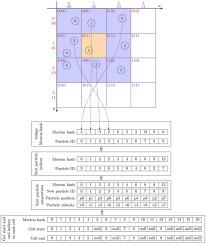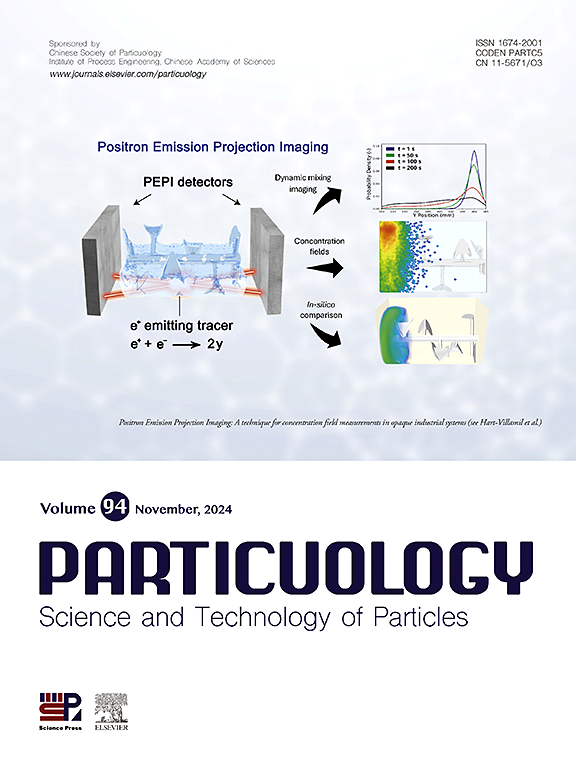An improved particle neighbor search algorithm with multi-level cache optimization strategy for discrete element method using GPU
IF 4.3
2区 材料科学
Q2 ENGINEERING, CHEMICAL
引用次数: 0
Abstract
This paper proposes an improved particle neighbor search algorithm, focusing on optimizing computational efficiency and memory usage in large-scale particle system simulations. By partitioning the simulation space into grids and combining it with Morton encoding, it ensures that adjacent grids are stored contiguously in memory, thereby enhancing the locality of data access and reducing the probability of cache misses. In the particle sorting phase, Morton encoding is used to rearrange the particles, further enhancing memory continuity and leveraging the hardware cache's prefetching mechanism to reduce data read latency. The algorithm also incorporates the idea of the Verlet table method by setting a sorting threshold to optimize the sorting process, avoiding redundant calculations and unnecessary sorting operations. Through the above optimization methods, a multi-level cache optimization strategy is achieved, significantly improving the algorithm's performance and memory utilization efficiency. Experimental results show that the algorithm proposed in this paper has significant advantages in large-scale particle simulations.

基于GPU的离散元法多级缓存优化改进粒子邻居搜索算法
本文提出了一种改进的粒子邻居搜索算法,重点是优化大规模粒子系统模拟的计算效率和内存使用。通过将仿真空间划分为网格,并结合Morton编码,保证相邻网格连续存储在内存中,从而增强数据访问的局部性,降低缓存丢失的概率。在粒子排序阶段,采用Morton编码对粒子进行重新排列,进一步增强内存连续性,并利用硬件缓存的预取机制减少数据读取延迟。该算法还结合了Verlet表方法的思想,通过设置排序阈值来优化排序过程,避免了冗余计算和不必要的排序操作。通过以上优化方法,实现了多级缓存优化策略,显著提高了算法的性能和内存利用效率。实验结果表明,本文提出的算法在大尺度粒子模拟中具有明显的优势。
本文章由计算机程序翻译,如有差异,请以英文原文为准。
求助全文
约1分钟内获得全文
求助全文
来源期刊

Particuology
工程技术-材料科学:综合
CiteScore
6.70
自引率
2.90%
发文量
1730
审稿时长
32 days
期刊介绍:
The word ‘particuology’ was coined to parallel the discipline for the science and technology of particles.
Particuology is an interdisciplinary journal that publishes frontier research articles and critical reviews on the discovery, formulation and engineering of particulate materials, processes and systems. It especially welcomes contributions utilising advanced theoretical, modelling and measurement methods to enable the discovery and creation of new particulate materials, and the manufacturing of functional particulate-based products, such as sensors.
Papers are handled by Thematic Editors who oversee contributions from specific subject fields. These fields are classified into: Particle Synthesis and Modification; Particle Characterization and Measurement; Granular Systems and Bulk Solids Technology; Fluidization and Particle-Fluid Systems; Aerosols; and Applications of Particle Technology.
Key topics concerning the creation and processing of particulates include:
-Modelling and simulation of particle formation, collective behaviour of particles and systems for particle production over a broad spectrum of length scales
-Mining of experimental data for particle synthesis and surface properties to facilitate the creation of new materials and processes
-Particle design and preparation including controlled response and sensing functionalities in formation, delivery systems and biological systems, etc.
-Experimental and computational methods for visualization and analysis of particulate system.
These topics are broadly relevant to the production of materials, pharmaceuticals and food, and to the conversion of energy resources to fuels and protection of the environment.
 求助内容:
求助内容: 应助结果提醒方式:
应助结果提醒方式:


